Deck 34: The Origin and Evolution of Vertebrates
Question
Question
Question
Question
Question
Question
Question
Question
Question
Question
Question
Question
Question
Question
Question
Question
Question
Question
Question
Question
Question
Question
Question
Question
Question
Question
Question
Question
Question
Question
Question
Question
Question
Question
Question
Question
Question
Question
Question
Question
Question
Question
Question
Question
Question
Question
Question
Question
Question
Question
Question
Question
Question
Question
Question
Question
Question
Question
Question
Question
Question
Question
Question
Question
Question
Question
Question
Question
Question
Question
Question
Question
Question
Question
Question
Question
Question
Question
Question
Question

Unlock Deck
Sign up to unlock the cards in this deck!
Unlock Deck
Unlock Deck
1/109
Play
Full screen (f)
Deck 34: The Origin and Evolution of Vertebrates
1
There is evidence that ray-finned fishes evolved
A) in response to a crisis that wiped out the chondrichthyans.
B) directly from lampreys and hagfish.
C) early in the Cambrian period.
D) directly from lancelets.
E) the swim bladder from a lung.
A) in response to a crisis that wiped out the chondrichthyans.
B) directly from lampreys and hagfish.
C) early in the Cambrian period.
D) directly from lancelets.
E) the swim bladder from a lung.
E
2
Chordate pharyngeal slits appear to have functioned first as
A) the digestive system's opening.
B) suspension-feeding devices.
C) components of the jaw.
D) gill slits for respiration.
E) portions of the inner ear.
A) the digestive system's opening.
B) suspension-feeding devices.
C) components of the jaw.
D) gill slits for respiration.
E) portions of the inner ear.
B
3
Arrange these taxonomic terms from most inclusive (most general)to least inclusive (most specific).
1)lobe-fins
2)amphibians
3)gnathostomes
4)osteichthyans
5)tetrapods
A) 4, 3, 1, 5, 2
B) 4, 3, 2, 5, 1
C) 4, 2, 3, 5, 1
D) 3, 4, 1, 5, 2
E) 3, 4, 5, 1, 2
1)lobe-fins
2)amphibians
3)gnathostomes
4)osteichthyans
5)tetrapods
A) 4, 3, 1, 5, 2
B) 4, 3, 2, 5, 1
C) 4, 2, 3, 5, 1
D) 3, 4, 1, 5, 2
E) 3, 4, 5, 1, 2
D
4
Which of these might have been observed in the common ancestor of chondrichthyans and osteichthyans?
A) a mineralized, bony skeleton
B) opercula
C) bony fin rays
D) a spiral valve intestine
E) a swim bladder
A) a mineralized, bony skeleton
B) opercula
C) bony fin rays
D) a spiral valve intestine
E) a swim bladder

Unlock Deck
Unlock for access to all 109 flashcards in this deck.
Unlock Deck
k this deck
5
A new species of aquatic chordate is discovered that closely resembles an ancient form. It has the following characteristics: external armor of bony plates, no paired lateral fins, and a suspension-feeding mode of nutrition. In addition to these, it will probably have which of the following characteristics?
A) legs
B) no jaws
C) an amniotic egg
D) endothermy
A) legs
B) no jaws
C) an amniotic egg
D) endothermy

Unlock Deck
Unlock for access to all 109 flashcards in this deck.
Unlock Deck
k this deck
6
How many of the following statements about craniates is (are)correct?
1)Craniates are more highly cephalized than are noncraniates.
2)Craniates' genomic evolution includes duplication of clusters of genes that code for transcription factors.
3)The craniate clade is synonymous with the vertebrate clade.
4)Pharyngeal slits that play important roles in gas exchange originated in craniates.
5)The two-chambered heart originated with the early craniates.
A) one of these
B) two of these
C) three of these
D) four of these
E) five of these
1)Craniates are more highly cephalized than are noncraniates.
2)Craniates' genomic evolution includes duplication of clusters of genes that code for transcription factors.
3)The craniate clade is synonymous with the vertebrate clade.
4)Pharyngeal slits that play important roles in gas exchange originated in craniates.
5)The two-chambered heart originated with the early craniates.
A) one of these
B) two of these
C) three of these
D) four of these
E) five of these

Unlock Deck
Unlock for access to all 109 flashcards in this deck.
Unlock Deck
k this deck
7
Which extant chordates are postulated to be most like the earliest chordates in appearance?
A) lancelets
B) adult tunicates
C) amphibians
D) reptiles
E) chondrichthyans
A) lancelets
B) adult tunicates
C) amphibians
D) reptiles
E) chondrichthyans

Unlock Deck
Unlock for access to all 109 flashcards in this deck.
Unlock Deck
k this deck
8
Which of the following belongs to the lobe-fin clade?
A) chondrichthyans
B) ray-finned fishes
C) lampreys
D) hagfishes
E) tetrapods
A) chondrichthyans
B) ray-finned fishes
C) lampreys
D) hagfishes
E) tetrapods

Unlock Deck
Unlock for access to all 109 flashcards in this deck.
Unlock Deck
k this deck
9
Which of these statements accurately describes a similarity between sharks and ray-finned fishes?
A) The skin is typically covered by flattened bony scales.
B) They are equally able to exchange gases with the environment while stationary.
C) They are highly maneuverable due to their flexibility.
D) They have a lateral line that is sensitive to changes in water pressure.
E) A swim bladder helps control buoyancy.
A) The skin is typically covered by flattened bony scales.
B) They are equally able to exchange gases with the environment while stationary.
C) They are highly maneuverable due to their flexibility.
D) They have a lateral line that is sensitive to changes in water pressure.
E) A swim bladder helps control buoyancy.

Unlock Deck
Unlock for access to all 109 flashcards in this deck.
Unlock Deck
k this deck
10
The lamprey species whose larvae live in freshwater streams, but whose adults live most of their lives in seawater, are similar in this respect to certain species of
A) chondrichthyans.
B) actinopterygians.
C) lungfishes.
D) coelacanths.
E) hagfishes.
A) chondrichthyans.
B) actinopterygians.
C) lungfishes.
D) coelacanths.
E) hagfishes.

Unlock Deck
Unlock for access to all 109 flashcards in this deck.
Unlock Deck
k this deck
11
Which group's members have had both lungs and gills during their adult lives?
A) sharks, skates, and rays
B) lungfishes
C) lancelets
D) amphibians
E) ichthyosaurs and plesiosaurs
A) sharks, skates, and rays
B) lungfishes
C) lancelets
D) amphibians
E) ichthyosaurs and plesiosaurs

Unlock Deck
Unlock for access to all 109 flashcards in this deck.
Unlock Deck
k this deck
12
To which of the following are the scales of chondrichthyans most closely related in a structural sense?
A) osteichthyan scales
B) reptilian scales
C) mammalian scales
D) bird scales
E) chondrichthyan teeth
A) osteichthyan scales
B) reptilian scales
C) mammalian scales
D) bird scales
E) chondrichthyan teeth

Unlock Deck
Unlock for access to all 109 flashcards in this deck.
Unlock Deck
k this deck
13
Jaws first occurred in which extant group of fishes?
A) lampreys
B) chondrichthyans
C) ray-finned fishes
D) lungfishes
E) placoderms
A) lampreys
B) chondrichthyans
C) ray-finned fishes
D) lungfishes
E) placoderms

Unlock Deck
Unlock for access to all 109 flashcards in this deck.
Unlock Deck
k this deck
14
The swim bladder of ray-finned fishes
A) was probably modified from simple lungs of chondrichthyans.
B) developed into lungs in saltwater fishes.
C) first appeared in sharks.
D) provides for regulation of buoyancy.
E) Two of the options listed are correct.
A) was probably modified from simple lungs of chondrichthyans.
B) developed into lungs in saltwater fishes.
C) first appeared in sharks.
D) provides for regulation of buoyancy.
E) Two of the options listed are correct.

Unlock Deck
Unlock for access to all 109 flashcards in this deck.
Unlock Deck
k this deck
15
What do all craniates have that earlier chordates did not have?
A) brain
B) vertebrae
C) cartilaginous pipe surrounding notochord
D) partial or complete skull
E) bone
A) brain
B) vertebrae
C) cartilaginous pipe surrounding notochord
D) partial or complete skull
E) bone

Unlock Deck
Unlock for access to all 109 flashcards in this deck.
Unlock Deck
k this deck
16
Lampreys differ from hagfishes in
A) lacking jaws.
B) having a cranium.
C) having pharyngeal clefts that develop into pharyngeal slits.
D) having a notochord throughout life.
E) having a notochord that is surrounded by a tube of cartilage.
A) lacking jaws.
B) having a cranium.
C) having pharyngeal clefts that develop into pharyngeal slits.
D) having a notochord throughout life.
E) having a notochord that is surrounded by a tube of cartilage.

Unlock Deck
Unlock for access to all 109 flashcards in this deck.
Unlock Deck
k this deck
17
Which of the following statements would be least acceptable to most zoologists?
A) The extant lancelets are contemporaries, not ancestors, of vertebrates.
B) The first fossils resembling lancelets appeared in the fossil record around 530 million years ago.
C) Recent work in molecular systematics supports the hypothesis that lancelets are the most recent common ancestor of all vertebrates.
D) The extant lancelets are the immediate ancestors of the fishes.
E) Lancelets display the same method of swimming as do fishes.
A) The extant lancelets are contemporaries, not ancestors, of vertebrates.
B) The first fossils resembling lancelets appeared in the fossil record around 530 million years ago.
C) Recent work in molecular systematics supports the hypothesis that lancelets are the most recent common ancestor of all vertebrates.
D) The extant lancelets are the immediate ancestors of the fishes.
E) Lancelets display the same method of swimming as do fishes.

Unlock Deck
Unlock for access to all 109 flashcards in this deck.
Unlock Deck
k this deck
18
A team of researchers has developed a poison that has proven effective against lamprey larvae in freshwater cultures. The poison is ingested and causes paralysis by detaching segmental muscles from the skeletal elements. The team wants to test the poison's effectiveness in streams feeding Lake Michigan, but one critic worries about potential effects on lancelets, which are similar to lampreys in many ways. Why is this concern misplaced?
A) A chemical poisonous to lampreys could not also be toxic to organisms as ancestral as lancelets.
B) Lamprey larvae and lancelets have very different feeding mechanisms.
C) Lancelets do not have segmental muscles.
D) Lancelets live only in saltwater environments.
E) Lancelets and lamprey larvae eat different kinds of food.
A) A chemical poisonous to lampreys could not also be toxic to organisms as ancestral as lancelets.
B) Lamprey larvae and lancelets have very different feeding mechanisms.
C) Lancelets do not have segmental muscles.
D) Lancelets live only in saltwater environments.
E) Lancelets and lamprey larvae eat different kinds of food.

Unlock Deck
Unlock for access to all 109 flashcards in this deck.
Unlock Deck
k this deck
19
The earliest known mineralized structures in vertebrates are associated with which function?
A) reproduction
B) feeding
C) locomotion
D) defense
E) respiration
A) reproduction
B) feeding
C) locomotion
D) defense
E) respiration

Unlock Deck
Unlock for access to all 109 flashcards in this deck.
Unlock Deck
k this deck
20
The feeding mode of the extinct conodonts was
A) herbivory.
B) suspension feeding.
C) predation.
D) filter feeding.
E) absorptive feeding.
A) herbivory.
B) suspension feeding.
C) predation.
D) filter feeding.
E) absorptive feeding.

Unlock Deck
Unlock for access to all 109 flashcards in this deck.
Unlock Deck
k this deck
21
What should be true of fossils of the earliest tetrapods?
A) They should show evidence of internal fertilization.
B) They should show evidence of having produced shelled eggs.
C) They should indicate limited adaptation to life on land.
D) They should be transitional forms with the fossils of chondrichthyans that lived at the same time.
E) They should feature the earliest indications of the appearance of jaws.
A) They should show evidence of internal fertilization.
B) They should show evidence of having produced shelled eggs.
C) They should indicate limited adaptation to life on land.
D) They should be transitional forms with the fossils of chondrichthyans that lived at the same time.
E) They should feature the earliest indications of the appearance of jaws.

Unlock Deck
Unlock for access to all 109 flashcards in this deck.
Unlock Deck
k this deck
22
Why is the amniotic egg considered an important evolutionary breakthrough?
A) It has a shell that increases gas exchange.
B) It allows deposition of eggs in a terrestrial environment.
C) It prolongs embryonic development.
D) It provides insulation to conserve heat.
E) It permits internal fertilization to be replaced by external fertilization.
A) It has a shell that increases gas exchange.
B) It allows deposition of eggs in a terrestrial environment.
C) It prolongs embryonic development.
D) It provides insulation to conserve heat.
E) It permits internal fertilization to be replaced by external fertilization.

Unlock Deck
Unlock for access to all 109 flashcards in this deck.
Unlock Deck
k this deck
23
Which of these are amniotes?
A) amphibians
B) fishes
C) egg-laying mammals
D) placental mammals
E) More than one of these is correct.
A) amphibians
B) fishes
C) egg-laying mammals
D) placental mammals
E) More than one of these is correct.

Unlock Deck
Unlock for access to all 109 flashcards in this deck.
Unlock Deck
k this deck
24
Which of the following represents the strongest evidence that two of the three middle ear bones of mammals are homologous to certain reptilian jawbones?
A) They are similar in size to the reptilian jawbones.
B) They are similar in shape to the reptilian jawbones.
C) The mammalian jaw has fewer bones than does the reptilian jaw.
D) These bones can be observed to move from the developing jaw to the developing middle ear in mammalian embryos.
E) Mammals can hear better than reptiles.
A) They are similar in size to the reptilian jawbones.
B) They are similar in shape to the reptilian jawbones.
C) The mammalian jaw has fewer bones than does the reptilian jaw.
D) These bones can be observed to move from the developing jaw to the developing middle ear in mammalian embryos.
E) Mammals can hear better than reptiles.

Unlock Deck
Unlock for access to all 109 flashcards in this deck.
Unlock Deck
k this deck
25
A trend first observed in the evolution of the earliest tetrapods was
A) the appearance of jaws.
B) the appearance of bony vertebrae.
C) feet with digits.
D) the mineralization of the endoskeleton.
E) the amniotic egg.
A) the appearance of jaws.
B) the appearance of bony vertebrae.
C) feet with digits.
D) the mineralization of the endoskeleton.
E) the amniotic egg.

Unlock Deck
Unlock for access to all 109 flashcards in this deck.
Unlock Deck
k this deck
26
For the following items, match the extant vertebrate groups with the descriptions.
Their scales most closely resemble teeth in both structure and origin.
A) amphibians
B) nonbird reptiles
C) chondrichthyans
D) mammals
E) osteichthyans
Their scales most closely resemble teeth in both structure and origin.
A) amphibians
B) nonbird reptiles
C) chondrichthyans
D) mammals
E) osteichthyans

Unlock Deck
Unlock for access to all 109 flashcards in this deck.
Unlock Deck
k this deck
27
Which of these would a paleontologist be most likely to do in order to determine whether a fossil represents a reptile or a mammal?
A) Look for the presence of milk-producing glands.
B) Look for the mammalian characteristics of a four-chambered heart and a diaphragm.
C) Because mammals are eutherians, look for evidence of a placenta.
D) Use molecular analysis to look for the protein keratin.
E) Examine the teeth.
A) Look for the presence of milk-producing glands.
B) Look for the mammalian characteristics of a four-chambered heart and a diaphragm.
C) Because mammals are eutherians, look for evidence of a placenta.
D) Use molecular analysis to look for the protein keratin.
E) Examine the teeth.

Unlock Deck
Unlock for access to all 109 flashcards in this deck.
Unlock Deck
k this deck
28
In which vertebrates is fertilization exclusively internal?
A) chondrichthyans, osteichthyans, and mammals
B) amphibians, mammals, and reptiles
C) chondrichthyans, osteichthyans, and reptiles
D) reptiles and mammals
E) reptiles and amphibians
A) chondrichthyans, osteichthyans, and mammals
B) amphibians, mammals, and reptiles
C) chondrichthyans, osteichthyans, and reptiles
D) reptiles and mammals
E) reptiles and amphibians

Unlock Deck
Unlock for access to all 109 flashcards in this deck.
Unlock Deck
k this deck
29
Examination of the fossils of Archaeopteryx reveals that, in common with extant birds, it had
A) a long tail containing vertebrae.
B) feathers.
C) teeth.
D) Three of the options listed are correct.
E) Two of the options listed are correct.
A) a long tail containing vertebrae.
B) feathers.
C) teeth.
D) Three of the options listed are correct.
E) Two of the options listed are correct.

Unlock Deck
Unlock for access to all 109 flashcards in this deck.
Unlock Deck
k this deck
30
Which of the following are the most abundant and diverse of the extant vertebrates?
A) ray-finned fishes
B) birds
C) amphibians
D) nonbird reptiles
E) mammals
A) ray-finned fishes
B) birds
C) amphibians
D) nonbird reptiles
E) mammals

Unlock Deck
Unlock for access to all 109 flashcards in this deck.
Unlock Deck
k this deck
31
For the following items, match the extant vertebrate groups with the descriptions.
Internal fertilization, leathery amniotic egg, and skin that resists drying are characteristics of
A) amphibians.
B) nonbird reptiles.
C) chondrichthyans.
D) mammals.
E) birds.
Internal fertilization, leathery amniotic egg, and skin that resists drying are characteristics of
A) amphibians.
B) nonbird reptiles.
C) chondrichthyans.
D) mammals.
E) birds.

Unlock Deck
Unlock for access to all 109 flashcards in this deck.
Unlock Deck
k this deck
32
Which of the following is characteristic of most extant reptiles and most extant mammals?
A) ectothermy
B) diaphragm
C) shelled eggs
D) keratinized skin
E) conical teeth that are relatively uniform in size
A) ectothermy
B) diaphragm
C) shelled eggs
D) keratinized skin
E) conical teeth that are relatively uniform in size

Unlock Deck
Unlock for access to all 109 flashcards in this deck.
Unlock Deck
k this deck
33
Which era is known as the "age of reptiles"?
A) Cenozoic
B) Mesozoic
C) Paleozoic
D) Devonian
E) Cambrian
A) Cenozoic
B) Mesozoic
C) Paleozoic
D) Devonian
E) Cambrian

Unlock Deck
Unlock for access to all 109 flashcards in this deck.
Unlock Deck
k this deck
34
At the end of which era did most dinosaurs and pterosaurs become extinct?
A) Cretaceous
B) Permian
C) Devonian
D) Ordovician
E) Triassic
A) Cretaceous
B) Permian
C) Devonian
D) Ordovician
E) Triassic

Unlock Deck
Unlock for access to all 109 flashcards in this deck.
Unlock Deck
k this deck
35
Which of the following are the only extant animals that descended directly from dinosaurs?
A) lizards
B) crocodiles
C) snakes
D) birds
E) tuataras
A) lizards
B) crocodiles
C) snakes
D) birds
E) tuataras

Unlock Deck
Unlock for access to all 109 flashcards in this deck.
Unlock Deck
k this deck
36
During chordate evolution, what is the sequence (from earliest to most recent)in which the following structures arose?
1)amniotic egg
2)paired fins
3)jaws
4)swim bladder
5)four-chambered heart
A) 2, 3, 4, 1, 5
B) 3, 2, 4, 1, 5
C) 3, 2, 1, 4, 5
D) 2, 1, 4, 3, 5
E) 2, 4, 3, 1, 5
1)amniotic egg
2)paired fins
3)jaws
4)swim bladder
5)four-chambered heart
A) 2, 3, 4, 1, 5
B) 3, 2, 4, 1, 5
C) 3, 2, 1, 4, 5
D) 2, 1, 4, 3, 5
E) 2, 4, 3, 1, 5

Unlock Deck
Unlock for access to all 109 flashcards in this deck.
Unlock Deck
k this deck
37
Female birds lay their eggs, thereby facilitating flight by reducing weight. Which "strategy" seems most likely for female bats to use to achieve the same goal?
A) lay shelled eggs
B) limit litters to a single embryo
C) refrain from flying throughout pregnancy (about 6 weeks long)
D) give birth to underdeveloped young, and subsequently carry them in a pouch that has teats
E) feed multiple embryos internally using placentas
A) lay shelled eggs
B) limit litters to a single embryo
C) refrain from flying throughout pregnancy (about 6 weeks long)
D) give birth to underdeveloped young, and subsequently carry them in a pouch that has teats
E) feed multiple embryos internally using placentas

Unlock Deck
Unlock for access to all 109 flashcards in this deck.
Unlock Deck
k this deck
38
Which of these characteristics added most to vertebrate success in relatively dry environments?
A) the shelled, amniotic egg
B) the ability to maintain a constant body temperature
C) two pairs of appendages
D) bony scales
E) a four-chambered heart
A) the shelled, amniotic egg
B) the ability to maintain a constant body temperature
C) two pairs of appendages
D) bony scales
E) a four-chambered heart

Unlock Deck
Unlock for access to all 109 flashcards in this deck.
Unlock Deck
k this deck
39
Why is the discovery of the fossil Archaeopteryx significant? It supports the
A) phylogenetic relatedness of birds and reptiles.
B) contention that birds are much older than we originally thought.
C) claim that some dinosaurs had feathers well before birds had evolved.
D) idea that the first birds were ratites.
E) hypothesis that the earliest birds were ectothermic.
A) phylogenetic relatedness of birds and reptiles.
B) contention that birds are much older than we originally thought.
C) claim that some dinosaurs had feathers well before birds had evolved.
D) idea that the first birds were ratites.
E) hypothesis that the earliest birds were ectothermic.

Unlock Deck
Unlock for access to all 109 flashcards in this deck.
Unlock Deck
k this deck
40
Among extant vertebrates, a sheet of muscle called the diaphragm is found in
A) birds.
B) monotremes.
C) marsupials.
D) placentals.
E) Three of the options listed are correct.
A) birds.
B) monotremes.
C) marsupials.
D) placentals.
E) Three of the options listed are correct.

Unlock Deck
Unlock for access to all 109 flashcards in this deck.
Unlock Deck
k this deck
41
Which of these species was apparently the first to craft stone tools?
A) Australopithecus garhi
B) H. erectus
C) H. ergaster
D) H. habilis
E) H. sapiens
A) Australopithecus garhi
B) H. erectus
C) H. ergaster
D) H. habilis
E) H. sapiens

Unlock Deck
Unlock for access to all 109 flashcards in this deck.
Unlock Deck
k this deck
42
Which of these species was the first to have some members migrate out of Africa?
A) Australopithecus garhi
B) H. erectus
C) H. ergaster
D) H. habilis
E) H. sapiens
A) Australopithecus garhi
B) H. erectus
C) H. ergaster
D) H. habilis
E) H. sapiens

Unlock Deck
Unlock for access to all 109 flashcards in this deck.
Unlock Deck
k this deck
43
Which of the following is the most specific group that includes both the Old World monkeys and the New World monkeys?
A) apes
B) Homo
C) anthropoids
D) hominins
E) primates
A) apes
B) Homo
C) anthropoids
D) hominins
E) primates

Unlock Deck
Unlock for access to all 109 flashcards in this deck.
Unlock Deck
k this deck
44
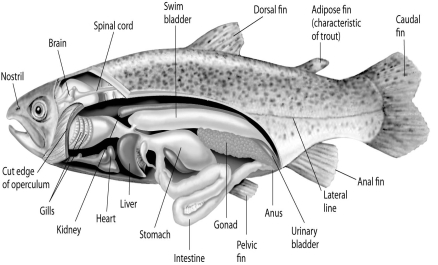
Figure 34.1
Fishes that have swim bladders can regulate their density and, thus, their buoyancy. There are two types of swim bladder: physostomus and physoclistus. The ancestral version is the physostomus version, in which the swim bladder is connected to the esophagus via a short tube (Figure 34.1). The fish fills this version by swimming to the surface, taking gulps of air, and directing them into the swim bladder. Air is removed from this version by "belching." The physoclistus version is more derived, and has lost its connection to the esophagus. Instead, gas enters and leaves the swim bladder via special circulatory mechanisms within the wall of the swim bladder.
The presence of a swim bladder allows the typical ray-finned fish to stop swimming and still
A) effectively circulate its blood.
B) be highly maneuverable.
C) use its lateral line system.
D) use its swim bladder as a respiratory organ.
E) not sink.

Unlock Deck
Unlock for access to all 109 flashcards in this deck.
Unlock Deck
k this deck
45
Which of the following is the most inclusive (most general)group, all of whose members have fully opposable thumbs?
A) apes
B) Homo
C) anthropoids
D) hominins
E) primates
A) apes
B) Homo
C) anthropoids
D) hominins
E) primates

Unlock Deck
Unlock for access to all 109 flashcards in this deck.
Unlock Deck
k this deck
46
Which of the following statements is correct in regard to Homo erectus?
A) Their fossils are not limited to Africa.
B) On average, H. erectus had a smaller brain than H. habilis.
C) H. erectus had a level of sexual dimorphism less than that of modern humans.
D) H. erectus was not known to use tools.
E) H. erectus evolved before H. habilis.
A) Their fossils are not limited to Africa.
B) On average, H. erectus had a smaller brain than H. habilis.
C) H. erectus had a level of sexual dimorphism less than that of modern humans.
D) H. erectus was not known to use tools.
E) H. erectus evolved before H. habilis.

Unlock Deck
Unlock for access to all 109 flashcards in this deck.
Unlock Deck
k this deck
47
Which of these species was the first to have been adapted for long-distance bipedalism?
A) Australopithecus garhi
B) H. erectus
C) H. ergaster
D) H. habilis
E) H. sapiens
A) Australopithecus garhi
B) H. erectus
C) H. ergaster
D) H. habilis
E) H. sapiens

Unlock Deck
Unlock for access to all 109 flashcards in this deck.
Unlock Deck
k this deck
48
With which of the following statements would a biologist be most inclined to agree?
A) Humans and apes represent divergent lines of evolution from a common ancestor.
B) Humans evolved directly from Old World monkeys.
C) Humans represent the pinnacle of evolution and have escaped from being affected by natural selection.
D) Humans evolved from chimpanzees.
E) Humans and apes are the result of disruptive selection in a species of chimpanzee.
A) Humans and apes represent divergent lines of evolution from a common ancestor.
B) Humans evolved directly from Old World monkeys.
C) Humans represent the pinnacle of evolution and have escaped from being affected by natural selection.
D) Humans evolved from chimpanzees.
E) Humans and apes are the result of disruptive selection in a species of chimpanzee.

Unlock Deck
Unlock for access to all 109 flashcards in this deck.
Unlock Deck
k this deck
49
Which of the following is a cluster of genes coding for transcription factors involved in the evolution of innovations in early vertebrate nervous systems and vertebrae?
A) Hox
B) Dlx
C) Otx
D) FOXP2
E) more than one of these
A) Hox
B) Dlx
C) Otx
D) FOXP2
E) more than one of these

Unlock Deck
Unlock for access to all 109 flashcards in this deck.
Unlock Deck
k this deck
50
Which of these species had members who moved out of Africa?
A) H. erectus
B) H. ergaster
C) H. habilis
D) H. sapiens
E) both H. sapiens and H. erectus
A) H. erectus
B) H. ergaster
C) H. habilis
D) H. sapiens
E) both H. sapiens and H. erectus

Unlock Deck
Unlock for access to all 109 flashcards in this deck.
Unlock Deck
k this deck
51
Which of these species is currently thought to have coexisted (at the same time and places)with H. neanderthalensis?
A) H. erectus
B) H. ergaster
C) H. habilis
D) H. sapiens
A) H. erectus
B) H. ergaster
C) H. habilis
D) H. sapiens

Unlock Deck
Unlock for access to all 109 flashcards in this deck.
Unlock Deck
k this deck
52
Which of the following are considered apes?
A) lorises
B) New World monkeys
C) Old World monkeys
D) orangutans
E) tarsiers
A) lorises
B) New World monkeys
C) Old World monkeys
D) orangutans
E) tarsiers

Unlock Deck
Unlock for access to all 109 flashcards in this deck.
Unlock Deck
k this deck
53
Which of these traits is most strongly associated with the adoption of bipedalism?
A) fingerprints
B) enhanced depth perception
C) shortened hind limbs
D) opposable big toe
E) repositioning of foramen magnum
A) fingerprints
B) enhanced depth perception
C) shortened hind limbs
D) opposable big toe
E) repositioning of foramen magnum

Unlock Deck
Unlock for access to all 109 flashcards in this deck.
Unlock Deck
k this deck
54
The oldest fossil remains of Homo sapiens found so far date from about
A) 6 million years ago.
B) 1.6 million years ago.
C) 195,000 years ago.
D) 60,000 years ago.
E) 16,000 years ago.
A) 6 million years ago.
B) 1.6 million years ago.
C) 195,000 years ago.
D) 60,000 years ago.
E) 16,000 years ago.

Unlock Deck
Unlock for access to all 109 flashcards in this deck.
Unlock Deck
k this deck
55
Which of the following statements about human evolution is correct?
A) Modern humans are the only human species to have evolved on Earth.
B) Human ancestors were virtually identical to extant chimpanzees.
C) Human evolution has occurred within an unbranched lineage.
D) The upright posture and enlarged brain of humans evolved simultaneously.
E) Fossil evidence indicates that early anthropoids were arboreal and cat-sized.
A) Modern humans are the only human species to have evolved on Earth.
B) Human ancestors were virtually identical to extant chimpanzees.
C) Human evolution has occurred within an unbranched lineage.
D) The upright posture and enlarged brain of humans evolved simultaneously.
E) Fossil evidence indicates that early anthropoids were arboreal and cat-sized.

Unlock Deck
Unlock for access to all 109 flashcards in this deck.
Unlock Deck
k this deck
56
Arrange the following taxonomic terms from most inclusive (most general)to least inclusive (most specific).
1)apes
2)hominins
3)Homo
4 anthropoids
5)primates
A) 5, 1, 4, 2, 3
B) 5, 4, 1, 2, 3
C) 5, 4, 2, 1, 3
D) 5, 2, 1, 4, 3
E) 5, 2, 4, 1, 3
1)apes
2)hominins
3)Homo
4 anthropoids
5)primates
A) 5, 1, 4, 2, 3
B) 5, 4, 1, 2, 3
C) 5, 4, 2, 1, 3
D) 5, 2, 1, 4, 3
E) 5, 2, 4, 1, 3

Unlock Deck
Unlock for access to all 109 flashcards in this deck.
Unlock Deck
k this deck
57
Which of these statements about human evolution is correct?
A) The ancestors of Homo sapiens were chimpanzees.
B) Human evolution has proceeded in an orderly fashion from an ancestral anthropoid to Homo sapiens.
C) The evolution of upright posture and enlarged brain occurred simultaneously.
D) Different species of the genus Homo have coexisted at various times throughout hominin evolution.
E) Mitochondrial DNA analysis indicates that modern humans are genetically very similar to Neanderthals.
A) The ancestors of Homo sapiens were chimpanzees.
B) Human evolution has proceeded in an orderly fashion from an ancestral anthropoid to Homo sapiens.
C) The evolution of upright posture and enlarged brain occurred simultaneously.
D) Different species of the genus Homo have coexisted at various times throughout hominin evolution.
E) Mitochondrial DNA analysis indicates that modern humans are genetically very similar to Neanderthals.

Unlock Deck
Unlock for access to all 109 flashcards in this deck.
Unlock Deck
k this deck
58
At least one of these has been found in all species of eumetazoan animals studied thus far.
A) Hox
B) Dlx
C) Otx
D) FOXP2
E) more than one of these
A) Hox
B) Dlx
C) Otx
D) FOXP2
E) more than one of these

Unlock Deck
Unlock for access to all 109 flashcards in this deck.
Unlock Deck
k this deck
59
What is the single unique characteristic that distinguishes extant birds from other extant vertebrates?
A) endothermy
B) feathers
C) an amniotic egg
D) flight
E) a four-chambered heart
A) endothermy
B) feathers
C) an amniotic egg
D) flight
E) a four-chambered heart

Unlock Deck
Unlock for access to all 109 flashcards in this deck.
Unlock Deck
k this deck
60
Which of the following is the most inclusive (most general)group, all of whose members have foramina magna centrally positioned in the base of the cranium?
A) hominoids
B) Homo
C) anthropoids
D) hominins
E) primates
A) hominoids
B) Homo
C) anthropoids
D) hominins
E) primates

Unlock Deck
Unlock for access to all 109 flashcards in this deck.
Unlock Deck
k this deck
61
The following questions refer to the phylogenetic tree shown in Figure 34.2.
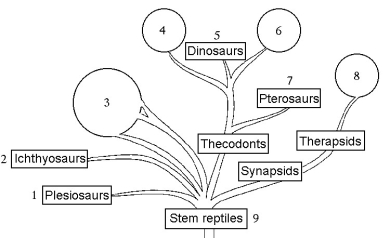
Figure 34.2
If circle 3 includes all of the extant reptiles that are ectotherms, then what do circles 4 and 6 represent?
A) crocodiles and birds
B) turtles and birds
C) ratites and carinates
D) mammals and birds
E) There is not enough information to say.

Figure 34.2
If circle 3 includes all of the extant reptiles that are ectotherms, then what do circles 4 and 6 represent?
A) crocodiles and birds
B) turtles and birds
C) ratites and carinates
D) mammals and birds
E) There is not enough information to say.

Unlock Deck
Unlock for access to all 109 flashcards in this deck.
Unlock Deck
k this deck
62
We should expect the inner wall of the swim bladder to be lined with tissue that is derived from
A) ectoderm.
B) endoderm.
C) mesoderm.
D) mesoglea.
E) neurectoderm.
A) ectoderm.
B) endoderm.
C) mesoderm.
D) mesoglea.
E) neurectoderm.

Unlock Deck
Unlock for access to all 109 flashcards in this deck.
Unlock Deck
k this deck
63
The organisms represented by number 8 are
A) birds.
B) mammals.
C) nonbird, terrestrial reptiles.
D) aquatic reptiles.
E) all mammals except humans.
A) birds.
B) mammals.
C) nonbird, terrestrial reptiles.
D) aquatic reptiles.
E) all mammals except humans.

Unlock Deck
Unlock for access to all 109 flashcards in this deck.
Unlock Deck
k this deck
64
Which shark structure is most analogous to a swim bladder full of gas?
A) its lateral line system
B) its spiral valve
C) its liver
D) its dead-end nostrils
E) its gills
A) its lateral line system
B) its spiral valve
C) its liver
D) its dead-end nostrils
E) its gills

Unlock Deck
Unlock for access to all 109 flashcards in this deck.
Unlock Deck
k this deck
65
Rank the following fish, from most to least, in terms of the amount of energy it must use to maintain its position (depth)in the water column over the long term.
1)physoclistus fish
2)physostomus fish
3)chondrichthyan fish
A) 1, 2, 3
B) 2, 3, 1
C) 2, 1, 3
D) 3, 1, 2
E) 3, 2, 1
1)physoclistus fish
2)physostomus fish
3)chondrichthyan fish
A) 1, 2, 3
B) 2, 3, 1
C) 2, 1, 3
D) 3, 1, 2
E) 3, 2, 1

Unlock Deck
Unlock for access to all 109 flashcards in this deck.
Unlock Deck
k this deck
66
The following questions refer to the phylogenetic tree shown in Figure 34.2.

Figure 34.2
Which number represents the birds?
A) 3
B) 4
C) 6
D) 8
E) 10, if it were at the end of a branch emerging from the dinosaurs

Figure 34.2
Which number represents the birds?
A) 3
B) 4
C) 6
D) 8
E) 10, if it were at the end of a branch emerging from the dinosaurs

Unlock Deck
Unlock for access to all 109 flashcards in this deck.
Unlock Deck
k this deck
67
In coelacanths, a swim bladder is present, but the swim bladder is full of adipose tissue (fat), which is there on a fairly permanent basis. If such a swim bladder is used by coelacanths to affect buoyancy, then it does so in much the same way as does the
A) liver of a shark.
B) physoclistus swim bladder.
C) physostomus swim bladder.
D) lung of a lungfish.
A) liver of a shark.
B) physoclistus swim bladder.
C) physostomus swim bladder.
D) lung of a lungfish.

Unlock Deck
Unlock for access to all 109 flashcards in this deck.
Unlock Deck
k this deck
68
If a physoclistus fish removes gas from its swim bladder, this fish's density cannot actually change until that gas arrives at the
A) mouth.
B) gills.
C) skin.
D) heart.
E) anus.
A) mouth.
B) gills.
C) skin.
D) heart.
E) anus.

Unlock Deck
Unlock for access to all 109 flashcards in this deck.
Unlock Deck
k this deck
69
When a shark stops swimming, it does which of the following?
1) sinks
2) quickly dies
3) oxygenates its blood less effectively
A) 1 only
B) 2 only
C) 3 only
D) 1 and 3
E) 1, 2, and 3
1) sinks
2) quickly dies
3) oxygenates its blood less effectively
A) 1 only
B) 2 only
C) 3 only
D) 1 and 3
E) 1, 2, and 3

Unlock Deck
Unlock for access to all 109 flashcards in this deck.
Unlock Deck
k this deck
70
Regarding its position in the water column, the same thing that happens to a shark when it stops swimming also happens to a
A) physostomus fish when it gulps air.
B) physoclistus fish when it moves gas from the blood into the water.
C) physoclistus fish when it moves gas from the swim bladder into the blood.
D) physoclistus fish when it moves gas from the blood into the swim bladder.
A) physostomus fish when it gulps air.
B) physoclistus fish when it moves gas from the blood into the water.
C) physoclistus fish when it moves gas from the swim bladder into the blood.
D) physoclistus fish when it moves gas from the blood into the swim bladder.

Unlock Deck
Unlock for access to all 109 flashcards in this deck.
Unlock Deck
k this deck
71
The following questions refer to the phylogenetic tree shown in Figure 34.2.

Figure 34.2
Whose DNA would have had the most sequence homologies with amphibian DNA?
A) 5
B) 6
C) 7
D) 8
E) 9

Figure 34.2
Whose DNA would have had the most sequence homologies with amphibian DNA?
A) 5
B) 6
C) 7
D) 8
E) 9

Unlock Deck
Unlock for access to all 109 flashcards in this deck.
Unlock Deck
k this deck
72
In order for the four-chambered hearts of birds and mammals to be homologous, which other organisms would have to have had four-chambered hearts?
A) dinosaurs
B) thecodonts
C) plesiosaurs
D) synapsids
E) stem reptiles
A) dinosaurs
B) thecodonts
C) plesiosaurs
D) synapsids
E) stem reptiles

Unlock Deck
Unlock for access to all 109 flashcards in this deck.
Unlock Deck
k this deck
73
The following questions refer to the phylogenetic tree shown in Figure 34.2.

Figure 34.2
Which number represents the closest relative to the parareptiles?
A) 1
B) 2
C) 3
D) 9
E) It is not possible to say.

Figure 34.2
Which number represents the closest relative to the parareptiles?
A) 1
B) 2
C) 3
D) 9
E) It is not possible to say.

Unlock Deck
Unlock for access to all 109 flashcards in this deck.
Unlock Deck
k this deck
74
The following questions refer to the phylogenetic tree shown in Figure 34.2.

Figure 34.2
Which pair of numbers represents extinct reptiles that had returned to an aquatic life?
A) 1 and 2
B) 3 and 4
C) 5 and 7
D) 6 and 8
E) 7 and 9

Figure 34.2
Which pair of numbers represents extinct reptiles that had returned to an aquatic life?
A) 1 and 2
B) 3 and 4
C) 5 and 7
D) 6 and 8
E) 7 and 9

Unlock Deck
Unlock for access to all 109 flashcards in this deck.
Unlock Deck
k this deck
75
If a ray-finned fish is to both hover (remain stationary)in the water column and ventilate its gills effectively, then what other structure besides its swim bladder will it use?
A) its heart
B) its pectoral fins
C) its lateral line system
D) its caudal (tail) fin
E) its opercula
A) its heart
B) its pectoral fins
C) its lateral line system
D) its caudal (tail) fin
E) its opercula

Unlock Deck
Unlock for access to all 109 flashcards in this deck.
Unlock Deck
k this deck
76
Which graph properly depicts the relationship between the amount of gas in the swim bladder and the density of the fish?
A)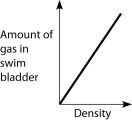
B)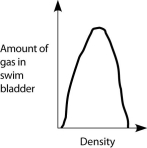
C)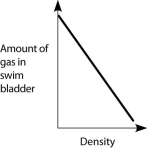
D)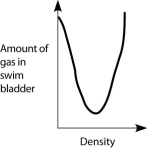
E)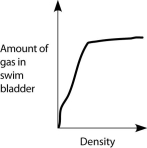
A)

B)

C)

D)

E)


Unlock Deck
Unlock for access to all 109 flashcards in this deck.
Unlock Deck
k this deck
77
The following questions refer to the phylogenetic tree shown in Figure 34.2.

Figure 34.2
Which of these numbers represents ectotherms that were able to fly?
A) 1
B) 2
C) 7
D) 8
E) It is not possible to say.

Figure 34.2
Which of these numbers represents ectotherms that were able to fly?
A) 1
B) 2
C) 7
D) 8
E) It is not possible to say.

Unlock Deck
Unlock for access to all 109 flashcards in this deck.
Unlock Deck
k this deck
78
Which graph below best represents the way that density changes over time in a physoclistus fish and in a physostomus fish, respectively?
A)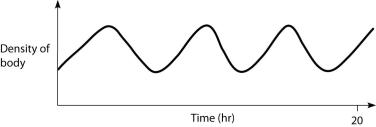
B)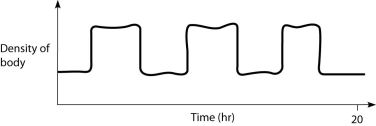
C)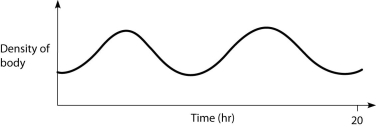
D))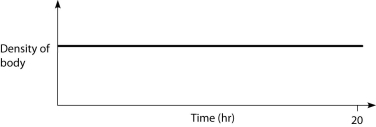
A) A and B
B) B and A
C) B and C
D) C and B
E) D and B
A)

B)

C)

D))

A) A and B
B) B and A
C) B and C
D) C and B
E) D and B

Unlock Deck
Unlock for access to all 109 flashcards in this deck.
Unlock Deck
k this deck
79
At 5, 10, and 15 hours in the graph below, which of the following statements should be true?
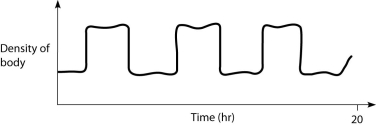
A) This fish is in the process of adding gas to its swim bladder.
B) This fish is in the process of removing gas from its swim bladder.
C) This fish has a swim bladder that is relatively full of gas.
D) This fish has a swim bladder that contains relatively little gas.

A) This fish is in the process of adding gas to its swim bladder.
B) This fish is in the process of removing gas from its swim bladder.
C) This fish has a swim bladder that is relatively full of gas.
D) This fish has a swim bladder that contains relatively little gas.

Unlock Deck
Unlock for access to all 109 flashcards in this deck.
Unlock Deck
k this deck
80
The following questions refer to the description below.
Terry catches a ray-finned fish from the ocean and notices that attached to its flank is an equally long, snakelike organism. The attached organism has no external segmentation, no scales, a round mouth surrounded by a sucker, and two small eyes. Terry thinks it might be a marine leech, a hagfish, or a lamprey.
Which feature excludes the organism from possibly being a leech?
A) elongated shape
B) lack of scales
C) lack of external segmentation
D) round mouth
E) anterior sucker
Terry catches a ray-finned fish from the ocean and notices that attached to its flank is an equally long, snakelike organism. The attached organism has no external segmentation, no scales, a round mouth surrounded by a sucker, and two small eyes. Terry thinks it might be a marine leech, a hagfish, or a lamprey.
Which feature excludes the organism from possibly being a leech?
A) elongated shape
B) lack of scales
C) lack of external segmentation
D) round mouth
E) anterior sucker

Unlock Deck
Unlock for access to all 109 flashcards in this deck.
Unlock Deck
k this deck


